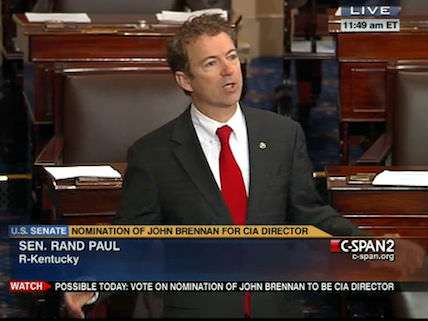How Rand Paul's Defense of Privacy Rights Challenges Conservative Orthodoxy
The libertarian-leaning GOP candidate champions an unenumerated constitutional right to privacy.

In his speech yesterday announcing his 2016 presidential campaign, Rand Paul gave the following reasons for why he is seeking the White House:
I have a vision for America. I want to be part of a return to prosperity, a true economic boom that lists all Americans, a return to a government restrained by the Constitution.
A return to privacy, opportunity, liberty.
Notice the word privacy. Now recall Rand Paul's recent speech at the annual Conservative Political Action Conference, or CPAC, in Washington, D.C. In that speech Paul declared:
We must remember that our rights our unlimited, unenumerated and given to us by God. Don't let anyone tell you otherwise. The Ninth Amendment said those rights not listed are not to be disparaged. You do have a right to privacy.
Do you have a right to privacy under the U.S. Constitution? Many top conservative legal theorists think not. The late Robert Bork, for example, who was perhaps the single most influential conservative legal thinker of the past half century, repeatedly castigated the Supreme Court for its 1965 decision in Griswold v. Connecticut, in which the Court first recognized a constitutional right to privacy in the course of striking down a state law prohibiting married couples from obtaining birth control devices. The problem with Griswold, Bork argued in the Indiana Law Journal, is that the Court invented "a new constitutional right" out of thin air. "When the Constitution has not spoken," Bork countered, "the only course for a principled Court is to let the majority have its way." In other words, because the Constitution does not expressly list the right to privacy among the Bill of Rights, the Supreme Court has no business enforcing that "right" against legislative enactments. Only enumerated rights are entitled to judicial protection under this conservative approach.
Rand Paul takes a different view. Indeed, in his now famous January 2015 speech attacking the doctrine of judicial restraint, Paul praised Griswold as an example of the Supreme Court refusing to defer to the majority and instead correctly protecting fundamental individual rights from government overreach. "What is the position of judicial restraint? The position of judicial restraint says let the states do whatever they want," Paul said. "Is that the conservative position? I think it's not my position. I think if the states do wrong, that we should overturn them. That there is a role for the Supreme Court to mete out justice."
As Paul's 2016 White House bid gets rolling, libertarians are watching closely to see if he'll try to minimize or even disown his previous statements challenging conservative orthodoxy. Judging by his launch speech yesterday, Paul remains on the libertarian side when it comes to the debate over whether or not the Constitution protects an unenumerated right to privacy.


Show Comments (66)